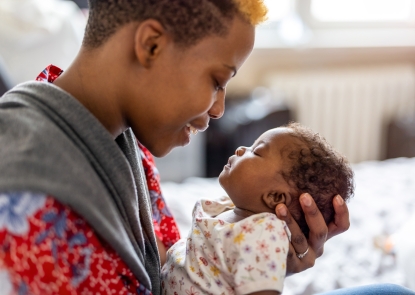MDMOM

Severe Maternal Morbidity Surveillance
Learning from hospital-based severe maternal morbidity (SMM) surveillance and review in Maryland.

Hospital Equity Initiative
Supporting interventions to improve systems of care and eliminate maternal health inequities.
The Maryland Maternal Health Innovation Program (MDMOM) is a five-year program to improve maternal health across the state of Maryland by coordinating innovation in the areas of maternal health data, hospital and US home visiting, training and resource availability. MDMOM is a collaboration between Johns Hopkins University, Maryland Department of Health and Maryland Patient Safety Center, and funded by Health Resources and Services Administration.
Maternal Health
In Maryland, both maternal mortality and severe maternal morbidity are consistently higher than national average and significant racial/ethnic disparities exist. Each year approximately 1,500 mothers experience a life-threatening pregnancy or delivery complication
Key Challenges in Maryland
The following challenges and metrics for maternal health were identified through key informant interviews and focus groups during the 2020 Title V Needs Assessment for Maryland:
- Inadequate access to high-risk obstetrics care in medically underserved areas
- Inadequate access to mental and behavioral health specialists
- Increasing substance use and increasing overdose deaths
- Structural racism and systemic biases
- Lack of social support and opportunity for perinatal health education
- Burnout and stress among health care, first responder, and public health workforce during COVID-19
Maternal Health Innovations
The Maryland Maternal Health Taskforce
The Maryland Maternal Health Task Force was convened by the Maryland Department of Health to address the needs of pregnant and postpartum women in Maryland. The task force is chaired by the Maryland Department of Health and brings together a diverse group of key stakeholders, including officials from state health governing bodies, departments, and agencies; professional organizations; maternity health care providers; insurance payers; patient advocacy groups; and local community organizations. The mission of the task force is to identify and support effective policies and initiatives that optimize current delivery systems in order to: meet the needs of communities that have been silenced as a result of structural racism; improve the quality of the full spectrum of reproductive, perinatal, and postpartum care; and strengthen service delivery systems for the medically- under-served.
Learn more about the work of the maternal health taskforce here
EMPOWER Maternal Warning Signs Education
To strengthen maternal warning signs education in Maryland, MDMOM partnered with Baltimore Healthy Start (BHS) to launch the Enhanced Maternal and Postpartum Warning Signs Education and Recognition for Moms (EMPOWER) Initiative. Through the EMPOWER initiative, MDMOM provides training and tools to home-visiting programs and other community-based service providers across the state to help families recognize and obtain care to address serious maternal complications that can arise during pregnancy and in the year after delivery.
Learn more about MDMOM’s EMPOWER initiative here.
Learn the maternal warning signs here.
Hospital Equity Initiative
MDMOM’s Hospital Equity Initiative provides training and quality improvement activities to Maryland’s 32 birthing hospitals to improve systems of care and eliminate maternal health inequities. The Hospital Equity Initiative offers online training on implicit bias, substance use disorder bias, and adverse maternal events, and hosts interactive implicit bias skill-building sessions to further support clinical practices that promote equity and safety. The Hospital Equity Initiative will also launch a Community of Learning to implement the MDMOM Maternal Health Equity Toolkit. The toolkit is designed to support Maryland hospital-based maternal health unit and department leaders and quality improvement specialists implement equity-focused interventions. It offers practical resources to support units/departments to understand the racial and ethnic maternal health inequities that exist among the patients they serve and take steps to eliminate them while creating a more equitable culture of care that will benefit all.
Learn more about MDMOM’s Hospital Equity Initiative here.
Severe Maternal Morbidity Surveillance
Severe Maternal Morbidity (SMM) includes potentially life-threatening conditions or complications resulting from the process of labor and delivery. SMM can be considered near-misses for maternal mortality and can have significant consequences for women’s health. To better understand SMM in Maryland, MDMOM implemented a systematic, ongoing process for case identification, clinical review, and analysis of SMM at the hospital level. By identifying preventable or potentially preventable SMM events and associated factors, participating facilities learn what worked and what did not work in the process of care, enabling them to recommend and implement practice changes or quality improvement initiatives to prevent future SMM and other adverse maternal outcomes from occurring.
Learn more about MDMOM’s SMM Surveillance & Review here.
Telehealth Portfolio
Obstetric care is a complex medical undertaking in the United States, with racial, ethnic, and nativity disparities and geographic challenges exacerbating inequitable access to services. In Maryland, specialty maternal-fetal medicine (MFM) services are concentrated in Baltimore and Annapolis, drastically limiting access to such services for women residing in peri-urban and rural areas. MDMOM developed a statewide perinatal telemedicine & telementoring network to: connect hospital obstetric providers with MFM specialists for peer-to-peer consultations and telementoring, and increase MFM specialist access for high-risk pregnant and postpartum through home telemedicine consults. A second telehealth initiative, MDMOM’s Telehealth Initiative for Severe Hypertension in Pregnancy, was developed to bolster efforts from the Maryland Perinatal Quality Collaborative in reducing a key driver of maternal morbidity and mortality across the state-- severe hypertension. The hospital-based initiative distributes free blood pressure monitors, cuffs, and patient education materials to pregnant and postpartum people who are diagnosed with a hypertensive disorder of pregnancy/chronic hypertension in Maryland.
Learn more about MDMOM’s Telehealth portfolio here.
